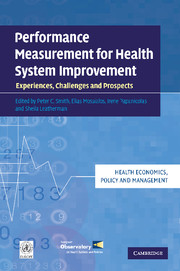Book contents
- Frontmatter
- Contents
- Foreword
- Acknowledgements
- List of contributors
- List of boxes, figures and tables
- Part I Principles of performance measurement
- Part II Dimensions of performance
- 2.1 Population health
- 2.2 Patient-reported outcome measures and performance measurement
- 2.3 Measuring clinical quality and appropriateness
- 2.4 Measuring financial protection in health
- 2.5 Health systems responsiveness: a measure of the acceptability of health-care processes and systems from the user's perspective
- 2.6 Measuring equity of access to health care
- 2.7 Health system productivity and efficiency
- Part III Analytical methodology for performance measurement
- Part IV Performance measurement in specific domains
- Part V Health policy and performance measurement
- Part VI Conclusions
- Index
2.2 - Patient-reported outcome measures and performance measurement
Published online by Cambridge University Press: 06 July 2010
- Frontmatter
- Contents
- Foreword
- Acknowledgements
- List of contributors
- List of boxes, figures and tables
- Part I Principles of performance measurement
- Part II Dimensions of performance
- 2.1 Population health
- 2.2 Patient-reported outcome measures and performance measurement
- 2.3 Measuring clinical quality and appropriateness
- 2.4 Measuring financial protection in health
- 2.5 Health systems responsiveness: a measure of the acceptability of health-care processes and systems from the user's perspective
- 2.6 Measuring equity of access to health care
- 2.7 Health system productivity and efficiency
- Part III Analytical methodology for performance measurement
- Part IV Performance measurement in specific domains
- Part V Health policy and performance measurement
- Part VI Conclusions
- Index
Summary
Introduction
One of the most important developments in the assessment of healthcare performance in recent years has been the demonstration that patients' and users' experiences of health and illness can be reliably and accurately captured by very simple means. It is now possible to capture aspects of health that are of most concern to individuals and populations – usually with self-completed and fairly short questionnaires. Typically these ask respondents to report, describe or assess aspects of their current health (e.g. symptoms); and the physical, psychological and social impact of health problems. The technical and scientific developments that have resulted in this capacity to capture patients' experiences have occurred over the last thirty years and these methods can now be considered mature, established and well-understood.
This chapter reviews the range of measures available and describes key considerations for selecting these for particular applications. It also considers the scope for widespread use of these measures to monitor health-care performance and the barriers that may limit such uses. Instruments in this field have been variously termed measures of quality of life, health status, health-related quality of life, subjective health status and functional status. The most important use of these questionnaires is for assessing outcomes of health care and increasingly they are referred to as patient-reported outcome measures (PROMs), the term used here.
- Type
- Chapter
- Information
- Performance Measurement for Health System ImprovementExperiences, Challenges and Prospects, pp. 63 - 86Publisher: Cambridge University PressPrint publication year: 2010
- 3
- Cited by



